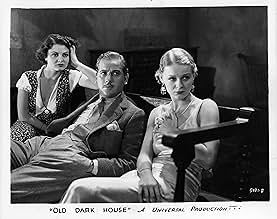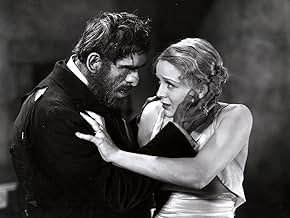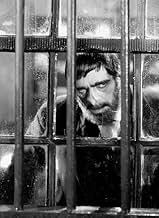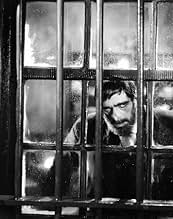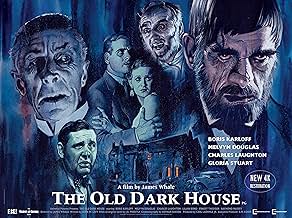PUNTUACIÓN EN IMDb
7,0/10
14 mil
TU PUNTUACIÓN
Buscando refugio durante una tormenta, cinco viajeros se encuentran en la propiedad de la familia Femm en una noche extraña y aterradora.Buscando refugio durante una tormenta, cinco viajeros se encuentran en la propiedad de la familia Femm en una noche extraña y aterradora.Buscando refugio durante una tormenta, cinco viajeros se encuentran en la propiedad de la familia Femm en una noche extraña y aterradora.
- Dirección
- Guión
- Reparto principal
- Premios
- 1 nominación en total
Reseñas destacadas
Truly one of Universal greatest unsung horror films, The Old Dark House is a unique blend of gothic setting, quirky characterizations, wicked black and dry humour, a great ensemble cast, and the workings of the mind of James Whale. Whale made the film the year after Frankenstein. He was again paired with Karloff. But unlike their first association, Karloff's star is far less brighter in this film as his performance, although good and servicable, is over-shadowed by atmosphere, Whale's direction, witty dialogue, and a cast of scene stealers such as Melvyn Douglas, Charles Laughton, Eva Moore, and Ernest Thesiger. Others in the notable cast include lovely Gloria Stuart, Lillian Bond, and Raymond Massey. Thesiger and Moore, as the brother and sister imposed upon by travellers in the stormy night, are fantastic as they interact and play out their eccentricities to perfection. Thesiger has the choice lines in the film as the effeminate Horace Femm, a cowardly man that cowers to his deaf sister. He is a joy to watch and each of his lines oozes with oil. Moore is also very good as she bellows repeatedly, "N beds! No beds! They can have no beds!" The story is based on a novel by J. B. Priestly. The plot is somewhat antiquated now, but Whale's direction puts a lot of life into it. And let's not forget Karloff, however small his part, still turns in a great menacing performance as a lecherous, drunken servant named Morgan ogling Gloria Stuart from the moment he sees her. The Old Dark House is a great film, and it should be more highly touted by Universal!
While perfectly enjoyable as a camp comedy of manners (that element comes courtesy of director James Whale) and as an elegant, low-key horror, The Old Dark House can best be appreciated when you know a little about JB Priestley, author of the source play Benighted. (Or was it originally a novel? It definitely exists as a stage play, at any rate.)
Priestley was an English playwright, novelist, radio broadcaster and journalist who became very well known in Britain in the 1930s and 1940s for presenting a kindly, commonsensical version of socialism and community spirit to a nation battling through the Great Depression, the Second World War and its aftermath. Several of his plays combine a supernatural or at least mysterious strain with an allegorical message about the importance of unselfishness and people working together to help one another. If you watch The Old Dark House with these points in mind you may see it in a more moving and profound light. Dangerous Corner and An Inspector Calls are similar examples of his work, still popular in Britain with amateur drama groups and touring theatre companies.
If you can, see Old Dark House and Whale's later Bride of Frankenstein as a home video double bill and compare Ernest Thesiger's delightfully feline and remarkably similar performances as Horace Femm and Dr Praetorius. "Have a potato" and "Have some gin" may well become part of your private family language for ever after.
Priestley was an English playwright, novelist, radio broadcaster and journalist who became very well known in Britain in the 1930s and 1940s for presenting a kindly, commonsensical version of socialism and community spirit to a nation battling through the Great Depression, the Second World War and its aftermath. Several of his plays combine a supernatural or at least mysterious strain with an allegorical message about the importance of unselfishness and people working together to help one another. If you watch The Old Dark House with these points in mind you may see it in a more moving and profound light. Dangerous Corner and An Inspector Calls are similar examples of his work, still popular in Britain with amateur drama groups and touring theatre companies.
If you can, see Old Dark House and Whale's later Bride of Frankenstein as a home video double bill and compare Ernest Thesiger's delightfully feline and remarkably similar performances as Horace Femm and Dr Praetorius. "Have a potato" and "Have some gin" may well become part of your private family language for ever after.
It's a funny experience when a film evokes déjà vu, only to realize the source of the déjà vu is, itself, intended to itself incite déjà vu. Picture this: a miserable storm sweeps a carload of normal people, as earnest as they are bedraggled, into taking refuge at a spooky old manor, only to be besieged and coveted by the prurient, camp Gothic inmates. But don't do the Time Warp again just yet: at the core of this Russian Doll of horror, pastiche, and dark humour lurks James Whale's oft-overlooked but seldom forgotten mini- masterpiece – The Old Dark House. As Poe-faced as if the script had been quoth by the Raven itself, Whale's film is, if not the granddaddy of most horror clichés, then at least the wry, drunken great-uncle. And, weathered as it is, time has been kind to this one, making The Old Dark House a creepy, clever, and sordidly amusing addition to the pantheon of horror classics. Singing not included; pelvic thrusting barely omitted.
If nothing else, The Old Dark House makes for a fascinating transitional tonal touch-point for Whale, one of the defining masters of classical horror. The film isn't as overtly satirical and camp as Whale's later monster mash-terpieces, The Invisible Man and, especially, Bride of Frankenstein, but it certainly shows him creeping in that direction, with a persistent snicker of irreverent naughtiness under its raspy breath. This isn't to say the film is an outright farce - indeed, Whale runs the gamut of thematic leitmotifs that would proceed to become preoccupations for decades of horror to follow: dogmatic religion, lurid sexuality, class discrepancies, and shunned, disabled family members. Yet, his film crackles with an invigorating, nervy energy, and his characters banter with zingy, pre-screwball fury, with several double-entendres pushing the boundaries of Hays Code knuckle-rapping with cheeky aplomb (maybe Whale assumed American censors wouldn't understand them through the Welsh accents?).
His setup is certainly foreboding enough, with the harried car ride prelude across flooding, lightning-scarred Welsh countryside a perfectly ominous amuse-bouche for the sinister, Gothic castle theatrics to come. Whale's flair for atmospheric mise-en-scène is superb, peppering the film with marvelously spooky flourishes and Expressionist lighting keeping the audience biting their nails throughout (one bit, where a woman makes shadow puppets on the wall with her hands, only to have a dark figure emerge from the shadow, is a jump scare for the ages). But Whale bides his time, keeping his pacing cunningly slow and allowing his film to froth at the mouth with looming tension.
Whale's film is also remarkable for the unprecedented access the audience is given to his cabal of characters. Too many horror films introduce characters as disposable (and disposed of) props, but Whale treats the first half of his potboiler like a theatre piece, as the growing crowd of storm refugees and reluctant hosts meet, and poke hopes, dreams, prejudices, and – mostly – fears out of each other. Whale's ensemble rises to the challenge, delivering genuinely well-crafted and compelling characters, particularly the suave, sharp-tongued Melvyn Douglas, the tough but chipper Lilian Bond, and, especially, Charles Laughton, who gives a remarkably heartfelt performance, his effete bluster whisking away to reveal a man plagued by terrible loneliness underneath. His monologue, revealing his bitter turn to capitalism as a means of finding purpose and escaping past tragedy, is strangely tragic and surprisingly moving amidst the film's tongue-in-cheek tone, and a curious counterpoint to Depression-era cinema's usual propensity for portraying the super-rich as vacuous twits. Ernest Thesiger and Eva Moore deliver masterclasses of brooding as the manor's sister tenants, while title star Boris Karloff is genuinely terrifying, his performance so much more affecting than the mere rage-ravaged riff on his Frankenstein lumbering and grunting you'd initially expect. Finally, Brember Wills gives a performance so deft and daringly over-the-top that he turns horror conventions on their head even while pushing new boundaries of skin-crawling, especially for the 1930s.
Whale's quieter companion piece to his more famous forays into the macabre may tip the cap more at Hitchcock than Mary Shelley, but ably continues his macro theme of humans being far more terrifying than any conventional 'monsters.' The Old Dark House may be humbler in scope, and somewhat more tonally imbalanced than some of its cohort of horror classics (including a swooning romantic subplot that's altogether too saccharine and sincere to play amidst its sardonic surroundings). Still, at a mere 72 minutes, the film is as concise and sardonically sinister as it is creepy, and still a slice of spine-tingling fun for an eerie, rainy night.
-8/10
If nothing else, The Old Dark House makes for a fascinating transitional tonal touch-point for Whale, one of the defining masters of classical horror. The film isn't as overtly satirical and camp as Whale's later monster mash-terpieces, The Invisible Man and, especially, Bride of Frankenstein, but it certainly shows him creeping in that direction, with a persistent snicker of irreverent naughtiness under its raspy breath. This isn't to say the film is an outright farce - indeed, Whale runs the gamut of thematic leitmotifs that would proceed to become preoccupations for decades of horror to follow: dogmatic religion, lurid sexuality, class discrepancies, and shunned, disabled family members. Yet, his film crackles with an invigorating, nervy energy, and his characters banter with zingy, pre-screwball fury, with several double-entendres pushing the boundaries of Hays Code knuckle-rapping with cheeky aplomb (maybe Whale assumed American censors wouldn't understand them through the Welsh accents?).
His setup is certainly foreboding enough, with the harried car ride prelude across flooding, lightning-scarred Welsh countryside a perfectly ominous amuse-bouche for the sinister, Gothic castle theatrics to come. Whale's flair for atmospheric mise-en-scène is superb, peppering the film with marvelously spooky flourishes and Expressionist lighting keeping the audience biting their nails throughout (one bit, where a woman makes shadow puppets on the wall with her hands, only to have a dark figure emerge from the shadow, is a jump scare for the ages). But Whale bides his time, keeping his pacing cunningly slow and allowing his film to froth at the mouth with looming tension.
Whale's film is also remarkable for the unprecedented access the audience is given to his cabal of characters. Too many horror films introduce characters as disposable (and disposed of) props, but Whale treats the first half of his potboiler like a theatre piece, as the growing crowd of storm refugees and reluctant hosts meet, and poke hopes, dreams, prejudices, and – mostly – fears out of each other. Whale's ensemble rises to the challenge, delivering genuinely well-crafted and compelling characters, particularly the suave, sharp-tongued Melvyn Douglas, the tough but chipper Lilian Bond, and, especially, Charles Laughton, who gives a remarkably heartfelt performance, his effete bluster whisking away to reveal a man plagued by terrible loneliness underneath. His monologue, revealing his bitter turn to capitalism as a means of finding purpose and escaping past tragedy, is strangely tragic and surprisingly moving amidst the film's tongue-in-cheek tone, and a curious counterpoint to Depression-era cinema's usual propensity for portraying the super-rich as vacuous twits. Ernest Thesiger and Eva Moore deliver masterclasses of brooding as the manor's sister tenants, while title star Boris Karloff is genuinely terrifying, his performance so much more affecting than the mere rage-ravaged riff on his Frankenstein lumbering and grunting you'd initially expect. Finally, Brember Wills gives a performance so deft and daringly over-the-top that he turns horror conventions on their head even while pushing new boundaries of skin-crawling, especially for the 1930s.
Whale's quieter companion piece to his more famous forays into the macabre may tip the cap more at Hitchcock than Mary Shelley, but ably continues his macro theme of humans being far more terrifying than any conventional 'monsters.' The Old Dark House may be humbler in scope, and somewhat more tonally imbalanced than some of its cohort of horror classics (including a swooning romantic subplot that's altogether too saccharine and sincere to play amidst its sardonic surroundings). Still, at a mere 72 minutes, the film is as concise and sardonically sinister as it is creepy, and still a slice of spine-tingling fun for an eerie, rainy night.
-8/10
Tod Browning (Freaks, Dracula), Karl Freund (The Mummy, Mad Love), Fritz Lang (Metropolis, M) and James Whale
. these are the guys that created the fabulous horror genre as we know it. And try to pick the most essential movie from Whale's repertoire! Alongside 'Bride of Frankenstein', this has got to be his finest creation and easily one of the most influential films ever made. The Old Dark House is a gripping mix of suspense and macabre black humor. The story is ridiculously simple and shows 5 people stranded near a remote, sinister house during a storm. There, they encounter the vicious and eccentric Femm family. The butler (played by the legendary Boris Karloff) is a dumb, scar-faced drunk; the lady of the house is deaf and aggressive and her brother speaks with an incomprehensible accent. On top of this, there's a bearded lady in the attic (supposed to be a 102-year-old guy) and a deranged pyromaniac brother locked up in yet another room! It sounds a little like the TCM Sawyer family forty years ahead of time. Whale constantly inserts subtle humor into his film, without actually losing a bit of the sublime Gothic atmosphere. This may well be the very FIRST haunted-house movie and he already makes it some sort of parody.
The Old Dark House is one of the lesser-known classic Universal horror movies, which is quite a shame. It's excellent every way you look at it. At first, it might seem a little slow (especially compared to Whale's equally brilliant 'Frankenstein' and 'The Invisible Man') but that's quickly made up by the utterly unique characters this film features. Classic, efficient horror like they'll never make it anymore.
The Old Dark House is one of the lesser-known classic Universal horror movies, which is quite a shame. It's excellent every way you look at it. At first, it might seem a little slow (especially compared to Whale's equally brilliant 'Frankenstein' and 'The Invisible Man') but that's quickly made up by the utterly unique characters this film features. Classic, efficient horror like they'll never make it anymore.
First one carload of normal people who can't go on due to flash flooding stop in a Gothic horror house for food and shelter and then another. Strange doings are happening at the house occupied by the Femm family and their mute servant Morgan.
You can't really say there is any kind of coherent plot to the unfolding events and plot for me is usually the one indispensable part of any film. But in this case I make an exception because obviously Director James Whale was having a little fun with the audience by now used to Universal Studios horror film products. Whale creates a film of dark moods and light banter among the guests who can't quite figure out what's with this family of weirdos.
The Old Dark House marked the American film debut of Charles Laughton and Laughton overacts outrageously as does the whole cast in the role a bluff, overbearing, but essentially good hearted Manchester businessman who's got himself a Sir before his name and is right proud of it. This was also early work for Melvyn Douglas and Raymond Massey as another two of the guests.
Boris Karloff plays the sinister and mute servant Morgan. Karloff had one of the great speaking voices ever in films and interesting that this and his break through role as the Frankenstein monster required no dialog.
The Old Dark House is one great Halloween movie and listen close to the campy dialog that will tickle your funny bone if you don't miss it.
You can't really say there is any kind of coherent plot to the unfolding events and plot for me is usually the one indispensable part of any film. But in this case I make an exception because obviously Director James Whale was having a little fun with the audience by now used to Universal Studios horror film products. Whale creates a film of dark moods and light banter among the guests who can't quite figure out what's with this family of weirdos.
The Old Dark House marked the American film debut of Charles Laughton and Laughton overacts outrageously as does the whole cast in the role a bluff, overbearing, but essentially good hearted Manchester businessman who's got himself a Sir before his name and is right proud of it. This was also early work for Melvyn Douglas and Raymond Massey as another two of the guests.
Boris Karloff plays the sinister and mute servant Morgan. Karloff had one of the great speaking voices ever in films and interesting that this and his break through role as the Frankenstein monster required no dialog.
The Old Dark House is one great Halloween movie and listen close to the campy dialog that will tickle your funny bone if you don't miss it.
¿Sabías que...?
- CuriosidadesThis was Boris Karloff's first credited starring role. His name had been left off the El doctor Frankenstein (1931) publicity packages and only credited in the end credits of that film.
- PifiasOne of Gloria Stuart's elaborate earrings is missing about mid-film, it reappears for 2 close up shots and disappears again in medium and long shots.
- Citas
Rebecca Femm: [feels the fabric of Margaret Waverton's low-cut gown] Fine stuff, but it'll rot.
Rebecca Femm: [touches Margaret's skin above the neckline] Finer stuff still, but it'll rot too!
- Créditos adicionalesBefore the Universal Pictures logo: PRODUCER'S NOTE: - Karloff, the mad butler in this production, is the same Karloff who created the part of the mechanical monster in "Frankenstein". We explain this to settle all disputes in advance, even though such disputes are a tribute to his great versatility
- ConexionesEdited into Pale Moonlight Theater: The Old Dark House (2015)
- Banda sonoraSingin' in the Rain
(uncredited)
Music by Nacio Herb Brown
Lyrics by Arthur Freed
Sung by Melvyn Douglas a cappella, with modified lyrics
[Penderel sings the song in the car as the he and the Wavertons make their way on the washed out road]
Selecciones populares
Inicia sesión para calificar y añadir a tu lista para recibir recomendaciones personalizadas
Detalles
- Fecha de lanzamiento
- País de origen
- Idioma
- Títulos en diferentes países
- The Old Dark House
- Localizaciones del rodaje
- Empresa productora
- Ver más compañías en los créditos en IMDbPro
Taquilla
- Recaudación en Estados Unidos y Canadá
- 25.678 US$
- Recaudación en todo el mundo
- 34.649 US$
- Duración
- 1h 12min(72 min)
- Color
- Relación de aspecto
- 1.37 : 1
Contribuir a esta página
Sugerir un cambio o añadir el contenido que falta



